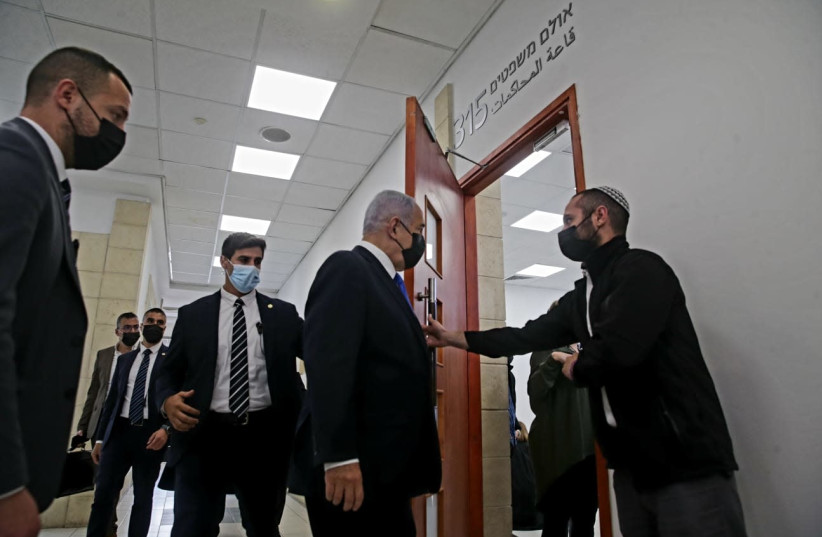The state prosecution on Monday set the stage for next week’s blockbuster testimony by Nir Hefetz in the public corruption trial of former prime minister Benjamin Netanyahu before the Jerusalem District Court.
To frame the testimony of Hefetz – a former top aide to Netanyahu turned state’s witness – the prosecution called former Competition Authority official and lobbyist, Dror Shtraum, to testify about the shakiness of telecommunications giant Bezeq in the November-December 2014 period.
In Case 4000, or the Bezeq-Walla Affair, the prosecution wants to prove that Netanyahu and Bezeq and Walla owner, Shaul Elovitch, conspired in a media bribery scheme.
Allegedly, the scheme helped the former prime minister with media coverage and helped Elovitch both escape financial disaster and reap an estimated NIS 1.8 billion in value through favorable government policies.
Shtraum testified that Bezeq was under heavy financial stress in late 2014 to get the Bezeq-Yes merger approved and that the telecommunications company was deeply concerned that without a quick approval of the merger by the government, approval by the relevant company boards could expire and fall through.

According to the Case 4000 indictment, by July 2014 Elovitch had pushed for Netanyahu to help provide government approval for the sale of Yes from Eurocom to Bezeq – all companies Elovitch had interests in, putting him in a conflict of interest.
Then communications minister Avi Berger was conditioning the sale on Bezeq’s undertaking of various market reforms which the ministry had demanded as well as maintaining various financial walls to limit dangers from Elovitch’s conflict.
Hefetz is expected to testify next week that a few days before a major November 28, 2014, meeting between Netanyahu and Elovitch, he showed the former prime minister proposals Elovitch gave Hefetz to gut Berger’s conditions.
Next, Hefetz will likely testify that Netanyahu requested that he carefully smuggle Elovitch into the meeting with him in a way that would cover up that they had met.
Both Hefetz and former Communications Ministry director-general turned state’s witness Shlomo Filber will likely testify that on December 9, 2014, Netanyahu appointed Eitan Tzafrir as chief of staff at the ministry to act as his long arm.
Subsequently, Netanyahu met with Berger and ordered him to carry out Elovitch’s wishes regarding the Bezeq-Yes merger, Berger has testified.
Eventually, Netanyahu fired Berger and replaced him with Filber to carry out Elovitch’s wishes regarding Bezeq, the indictment alleged.
Despite scoring some points in setting the stage for Hefetz, there were questions about whether the prosecution should have brought Shtraum as a witness.
On cross-examination, the defense succeeded at getting Shtraum to say that despite government policy blocking a Bezeq-Yes merger dating back to 2006, that by 2014, conditions had changed radically with other competitors already in the telecommunications market.
Shtraum also supported the defense’s attack on Berger’s policy of ignoring many letters by Bezeq and Yes regarding the merger.
Berger has said that Bezeq and Yes knew the conditions for the merger and were themselves ignoring those conditions with their many letters, which meant he had no reason to respond.
But Shtraum suggested that responding and reiterating conditions for a merger to parties requesting one was standard practice.
In a bizarre moment, the defense tried to get Shtraum declared an expert witness to attack the prosecution’s narrative regarding the merger and the prosecution tried to convince the court to disregard anything he said (though he was a prosecution witness) beyond his direct factual exposure to Bezeq’s vulnerability in late 2014.
The prosecution had even more trouble with former Eurocom deputy-CEO Felix Cohen.
Cohen had told the police during his pretrial interrogations that Bezeq was financially unstable in 2015 and that immediately after the Bezeq-Yes merger, NIS 900 million was handed over to several banks to pay off debts.
Though the defense agreed to have these statements put into the court record, on cross-examination, the defense found Cohen to be highly beneficial as he contradicted these assessments.
While he did not retract his statement about the NIS 900m., he tried to minimize its significance, saying that it was not an unusual move for a giant company like Bezeq and that the company’s financial troubles happened later when one of its major satellites failed.
The prosecution framed Cohen’s statements on cross-examination as trying to help his former company and boss, whereas when he testified to police, he knew he was being probed for potential criminal charges and therefore told the full truth.
Hefetz is due to begin testifying on November 16, and it is possible that Netanyahu himself will attend the hearing – which would be the first time he will have attended a court hearing since April.
